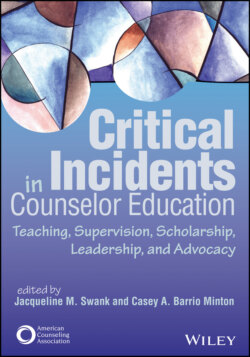Читать книгу Critical Incidents in Counselor Education - Группа авторов - Страница 59
Chapter 6
I’m Here, I’m Not Participating: Student Resistance to a Group Experience
ОглавлениеSamir H. Patel
2014 ACA Code of Ethics Standards Addressed
F.7.c. Infusing Multicultural Issues/Diversity
F.8.c. Self-Growth Experiences
• • •
Professor Dev Dixit, a 41-year-old Asian American counselor educator, was teaching Group Counseling for the second time. The class was made up of 23 students who ranged in age from 21 to 43, with the mean age around 24. Per program requirements, students were required to participate in an experiential counseling group in which wellness was the focus. Each group consisted of seven or eight students, and groups were facilitated by doctoral students. After each session, the students (i.e., group members) submitted a reflection to Professor Dixit.
After the first group experience, one student’s reflection gave Professor Dixit more pause than the others. Carla, the oldest student in the class at 43, reflected on some logistics regarding group: completing ice breakers; establishing group rules; setting goals; and discussing consent, confidentiality, and limits to confidentiality. On several occasions, Carla noted age differences between her and the rest of the group, including the group facilitator. Carla noted that all her fellow group members were in their early 20s, and the group facilitator, Thomas, seemed to be in his early 30s.
Carla reported that she felt some frustration toward the other group members concerning their “current station in life.” She pointed out that when the group members introduced themselves they all spoke about aspects of their social lives and coming into their graduate studies directly from their undergraduate programs. In contrast, Carla noted that she was married with children and had been awarded her undergraduate degree “nearly two decades ago.” She ended her reflection by stating that she would keep an open mind but that she had reservations regarding “this group thing.”
Professor Dixit observed the great detail Carla put into her reflection. As he thought back on her presence in the first few face-to-face classes, nothing remarkable struck him. She was polite, participated in discussions and activities, and had passed her first quiz (which indicated that she was reading the assigned chapters). Thus, he decided not to give her any direct feedback, as people were sometimes slow to warm up.
In Carla’s second reflection, Professor Dixit observed that Carla’s distance from the group continued to widen. She opened by describing Thomas’s check-in and his intervention of exploring progress made on their established goals. Previously Carla had stated her goal was to be more consistent with physical wellness. However, in this reflection she noted that she had “little to no room to change” her routine. She discussed how her job as coordinator of the university testing center was “extremely demanding” and the fact that because her husband was the chair of the chemistry department she bore most of the child-rearing responsibilities.
Carla also wrote about Thomas’s effort to connect wellness and counselor efficacy via The Indivisible Self (Myers & Sweeney, 2004). She stated that despite feeling supported by Thomas during the session, she still did not experience a sense of connection with the group. Carla explained that she was feeling out of place because she and other group members were “in totally different places . . . developmentally speaking.” She closed the reflection by stating, “I wonder if I could just come to group to meet requirement expectations but not participate like the others.”
Professor Dixit pondered Carla’s experiences in group and her closing statement in the second reflection. He was mindful of the 2016 Council for Accreditation of Counseling and Related Educational Programs (CACREP) Standards (CACREP, 2016), which note that students need to participate as group members for a minimum of 10 hours (Section 2, Standard F.6.h.). In addition, the ACA Code of Ethics (American Counseling Association [ACA], 2014) indicate that counselor educators should assist students in a timely fashion when professional competency is in jeopardy (Standards F.8.d., F.9.b.). However, his decade of clinical experience informed his awareness of how forcing self-growth may lead to resistance, the antithesis of what he wanted for Carla. He was aware of the truth in Carla’s reflections: She felt disconnected from the group because of differences in age. Although she was aware of this disconnect and the requirements of the course, Professor Dixit believed she was not fully in touch with the consequences of nonparticipation, both personally or professionally.
